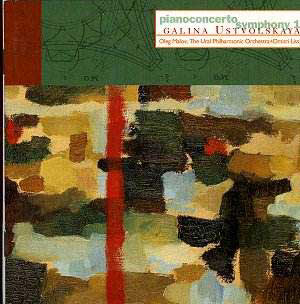Galina Ustvolskaya has long been the Mystery Woman
of Russian music. Little of her personal history was known whereas her
music did not fare any better. She studied with Shostakovich who greatly
admired her achievement. Nevertheless, later in life, she often expressed
harsh comments on Shostakovich’s personality and work, to the point
of disclaiming any influence of Shostakovich on her own music. Actually,
she seems to live in a self-imposed isolation, refusing interviews and
commissions, forbidding any analysis of her music which, according to
her, should not be compared with any other. However, some musicians,
such as the pianist Oleg Malov, championed her music which was progressively
known in the West, though this only happened in the mid-1980s. Her reputation
rests on a mere handful of highly personal works. There are actually
twenty-one of them including some sizeable piano sonatas, pieces for
various ensembles and five symphonies. Her list of works also includes
four pieces written during the 1950s in a seemingly more traditional
manner, more akin (so we are told) to Socialist Realism, though they
did not make her better-known or appreciated, were it only by the State’s
Nomenklatura.
One of the earliest works that she still acknowledges
is the Concerto for Piano, Strings and Timpani completed
in 1946 when she was a mere twenty-nine. Shostakovich’s shadow looms
large over this impressive work that already points towards some later
characteristics found in Ustvolskaya’s music, especially her reliance
on ostinati and repetitive phrases (e.g. the coda of this concerto).
It is cast in one single movement falling into three shorter sections:
The dramatically intense first section, characterised by a declamatory
theme for strings reminiscent of Shostakovich, leads into a slow, rather
bleak meditation followed by a final section actually restating some
of the earlier material and capped by an independent coda. This is a
deeply serious piece of music from first to last, a substantial achievement
on all counts; and one cannot but wonder why music of such emotional
power and of such musical integrity has remained unheard and unrecorded
for so many (too many!) long years.
Ustvolskaya’s output includes five symphonies, none
of which really fits into the symphonic canon. All but the First have
religious subtitles although they are definitely not religious works
and are scored for rather unusual forces, but more on this in another
review. However, the Symphony No.1, completed in 1955,
is the only one to be scored for more or less traditional orchestral
forces in which winds, brass and percussion are particularly prominent,
the strings being confined to a secondary role. The structure of the
piece however is quite unusual. The first movement is a short introduction,
mostly for winds, made of massive sound pillars, some sort of hieratic
chorale. The second movement, scored for two treble voices and orchestra,
sets several short poems by the Italian Communist writer Gianni Rodari
whose work was much admired in Russia during the Stalinist era. These
texts evoke the fate of poor children, victims of the Capitalist world.
The third movement is again for orchestra and ends with a bleak epilogue
abruptly cut short. Curiously enough, the ideologically correct content
of the texts used in the symphony did not earn the composer the regime’s
approval, and the work received its first performance in 1966 only.
If Shostakovich’s influence is clearly audible in the Piano Concerto,
that of Stravinsky is much more in evidence in the First Symphony; but
the Stravinsky of the Symphonies pour instruments à vent
or the Symphony of Psalms. Nevertheless, from the emotional
point of view, Ustvolskaya’s work is worlds apart from the intensely
religious character of Stravinsky’s Symphony of Psalms.
However, Ustvolskaya’s First Symphony is a beautiful work of great expressive
power and, for all its unremitting bleakness, a quite impressive achievement.
This is a very fine release, superbly played by musicians
who really believe in the music and give it dedicated, committed readings.
Excellent recording and informative notes by Frans Lemaire. This is
by far the finest introduction to Ustvolkaya’s unique sound world. A
pity though that the total playing time is rather on the short side
and it would have been most interesting if any or all of her other orchestral
works could have been recorded, were it only to allow for a more comprehensive
appraisal of her musical progress.
Hubert Culot


